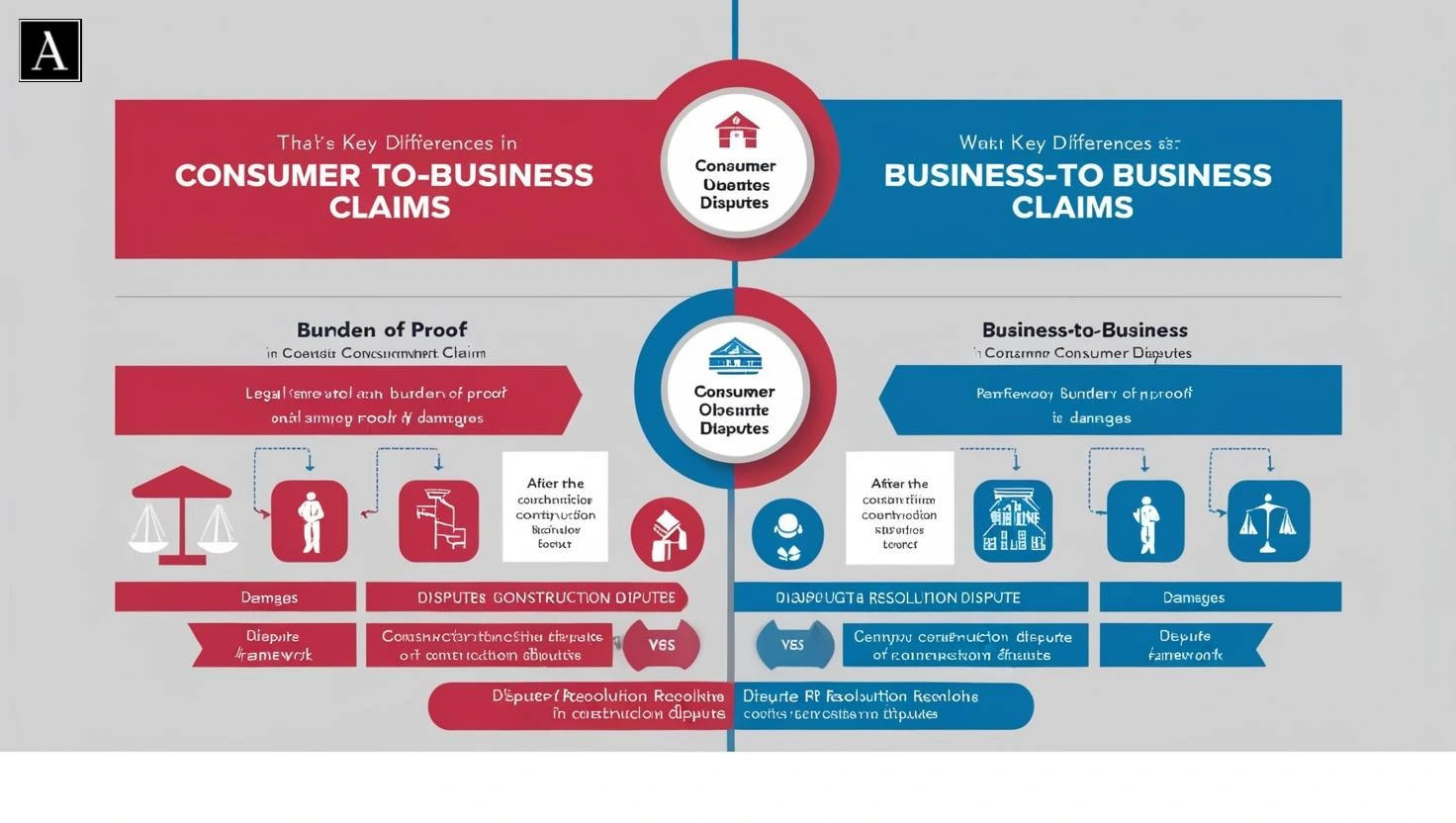What is the Difference Between a Consumer's Claim and A Business-to-Business Claim in Construction Disputes?
Construction disputes in Sweden take different forms and are treated differently. Complaints raised by businesses are handled differently from those made by private homeowners. The nature of the party involved in a particular construction dispute determines their legal rights, and even the platform where the respective case will be heard.
Let’s discuss how a consumer’s claim differs from a business-to-business claim in a construction dispute.


The Major Difference Between a Consumer’s Claim and A B2B Claim in Construction Disputes
The major aspect differentiating a B2B claim from a consumer’s claim in a construction dispute in Sweden is the legal protections and processes involved in the two claims.
A private individual files a consumer’s claim for issues experienced in the personal construction work. The Konsumenttjanstlagen (Consumer Services Act) governs this claim and provides non-waivable protections to safeguard consumers in such disputes.
On the other hand, a company or a group of professionals in an organization files a B2B claim. The Avtalslagen (Contracts Act) and the Koplagen (Sale of Goods Act) regulate this claim. Parties in a B2B claim are expected to have contractual freedom and knowledge, so they undergo strict protocols and have fewer protections than those provided to the consumer claims.
Let’s break down the different aspects of these two claims to help you better understand their difference.
Legal Swedish Definitions: Consumer vs. Business
It is important to comprehend the definitions of consumer and business according to Swedish law to better understand the difference between a consumer’s and business-to-business claims.
- Konsument (Consumer): According to Swedish law, a consumer works in private capacity and hires a service provider or contractor for a personal construction-related project, such as renovating their home or constructing a building or a house.
- Företag (Business): According to Swedish law, a business is a professional party or entity participating in commercial activities. For instance, a real estate developer who hires a subcontractor for a construction project is considered a business entity.
Both these definitions are crucial in governing the legal standing of these parties and determining the laws that will apply to them in a construction dispute.
Applicable Laws for Consumers and B2B Claims
Let’s look at the different laws that apply to consumers’ and business-to-business claims.
Laws that Apply to Consumers’ Claims
The Konsumenttjanstlagen, or the Consumer Services Act, regulates consumer claims. This law safeguards the rights of private individuals when buying a service, particularly a service related to construction.
The key provisions of this law are:
- Consumers get certain legal rights; any contract or agreement cannot waive them.
- The contractor has more responsibility to provide proper service and is held accountable for it.
- If something is ambiguous in the contract, the interpretation that favors the consumer will typically be chosen.
Laws that Apply to Business-to-Business Claims
The Koplagen, or Sale of Goods Act, and the Avtalslagen, or Contracts Act, govern all business-to-business claims related to construction disputes. Both these laws provide more freedom and flexibility in creating contract terms. However, they don’t provide as much protection as that offered to consumers.
The key points of these laws include:
- All contractual agreements are legally binding and must be adhered to unless a party finds them unfair.
- Both parties involved in a construction project must have equal understanding and knowledge of the laws involved.
- The parties involved must present complete evidence to prove their point. Both sides are treated fairly, and no party gets any extra advantage to establish their respective claim.
Channels to Resolve Disputes
The channels to resolve disputes that consumers and business entities experience are also different from one another.
Conflict Resolution Channels for Consumers
There are two main channels for resolving a construction dispute claim by a consumer.
- Allmanna Reklamationsnamnden (ARN): It is a consumer-focused alternative dispute resolution entity that provides free-of-cost services to consumers without them having to go to court.
- Tingsratten or District Court: If the ARN cannot resolve an issue related to a consumer’s claim in a construction dispute, the consumer can approach the Tingsratten and present their case to it.
Conflict Resolution Channels for Businesses
Businesses do not have the right to approach ARN for a construction-related dispute. The bodies that can help with business-to-business claims in a construction dispute include:
- Tingsratten: This is the primary legal venue business entities should approach to resolve disputes.
- Arbitration: They can take the arbitration route if it is mentioned in the contract.
Both legal channels usually require the complainant to have legal representation. They are also more expensive and have a more formal structure.
Key Features and Requirements of Consumer Claims
Consumer claims are protected by extensive legal protection. Swedish consumer law governs all consumer claims and helps consumers get the proper compensation for their claims.
Standard Requirements for A Consumer Claim
Typically, the standard requirements for a consumer to have a valid claim include the following:
- The claim must involve either a home or personal property.
- The consumer must file a complaint within 2 years of experiencing the conflict unless some warranty extends the time.
- The contractor involved in the dispute must be a legal business entity.
Consumer Rights
The consumer rights that a consumer can exercise include:
- The right to cancel the complaint within 14 days in case of an off-premise agreement.
- Claim the right to a refund, contract cancellation, or rectification.
- The right to withhold any payment for poor or incomplete work.
Evidence A Consumer Needs
A consumer must provide the following evidence to support their claim:
- Videos and/ or photos of the byggfel (construction defects) under discussion.
- If third-party inspection applies to the case, the consumer must provide those inspection reports with their claim.
- All the signed contracts, agreements, letters, emails, and invoices.
The proof helps the consumer effectively resolve their dispute.
Key Features and Requirements of B2B Claims
Business-to-business claims depend primarily on the contract’s clarity and strength. Legal protections aren’t offered automatically.
The Standard Requirements
Generally, the standard requirements that businesses must fulfill to file a claim in case of a construction dispute include:
- The parties in the dispute must be legally valid business entities.
- The parties must strictly abide by the terms and rules stipulated in their written agreement.
Rights and Responsibilities of a Business Entity
The responsibilities and rights that a business entity has include the following:
- Equal responsibility and negotiation rights for the terms in the contract.
- Verbal changes or informal agreements are challenging to prove.
- Custom clauses and stipulations are enforceable.
Evidence A Business Needs
A business entity must provide the following evidence to support its claim:
- Signed modifications, timelines, and blueprints
- Comprehensive purchase orders and contracts
- Billing records and communication logs
Contractual clarity and proper documentation are essential to make a business-to-business claim strong.
Burden of Proof
The burden of proof for consumers and businesses is also different. In a legal issue or dispute, it is basically the responsibility of the complainant to provide supporting evidence to prove their claims.
Burden of Proof for Consumers
- Contractors are massively responsible for proving the quality of their work in the case of a consumer complaint.
- Consumers need to prove that there are existing defects in the construction, and those defects impact their usability.
Burden of Proof for Businesses
- The burden of proof on the business entity and contractor in case of a B2B complaint is usually equal.
- Both parties need to have proper documentation to prove their defenses and claims.
In court, consumer protection laws and regulations favor individuals more. Businesses, on the other hand, need to present more structured and elaborate evidence to prove their claims.
Flexibility in the Contractual Terms
In the case of a consumer complaint, the law provides special protection to the consumer and certain rights irrespective of the contractual terms. If a consumer signs a contract to give up their rights, the law safeguards them, and their rights won’t be stripped away.
On the other hand, in a B2B complaint, penalty clauses and arbitration are legally enforceable. The business entities and contractors involved also have more flexibility and freedom to define the terms, obligations, and clauses, along with the probable remedies.
Time Limitation for Consumer and B2B Claims
A consumer must file their claim in case of a construction dispute within 2 years of finding byggfel, or experiencing a construction-related conflict. If the case involves hidden byggfel or structural faults, the timeline gets extended to around 10 years.
In the case of a business-to-business claim in a construction dispute, a standard limitation of 3 years applies following the Contracts Act. Contractually, the parties can agree on shorter or even longer deadlines. Business entities must not miss those deadlines, as they can lose the right to their claim.
Remedies and Enforcement for Consumer and B2B Claims
The enforcement regulation and remedies for consumer claims and business-to-business claims are also different.
Enforcement and Remedies for Consumer Claims
Strong statutory rights protect consumers, particularly under consumer protection laws. These laws aim to establish an objective marketplace that ensures consumers don’t struggle with a disadvantage when they have a conflict with a business.
- Remedies Ordered by the Court: If a certain consumer receives poor service or a defective product, or the court has somehow misled them, the court can give orders for different corrective measures, such as:
- Price reductions
- Contract cancellations
- Partial or full refunds
- Replacements or repairs
- Favorable Legal Framework: The law typically assumes that the consumer who has filed the complaint has a relatively weak bargaining stance, which is why the legal standards and burden of proof usually favor the consumer. Statutes such as the EU consumer directive or the Swedish Consumer Sales Act (Konsumentkoplagen) require that the sellers fix the problems without charging additional costs than the consumer has already paid. The rectification must be done within a time stipulated by the governing body.
Enforcement and Remedies for B2B Claims
A strict contractual framework regulates the enforcement of different remedies for business-to-business claims in a construction dispute. Businesses must clearly define all the rights and remedies in their contract.
- Contractual Remedies: The courts usually uphold all the terms stipulated in a legally valid contract. Those terms must not be grossly unfair or illegal. A business that seeks remedies for a breach or non-performance should rely on the following:
- Liability clauses and warranties that are clearly described
- Remedies such as termination of rights or payment of damages
- Compliance with the dispute resolution mechanisms and notice requirements
- Remedies with No Guarantee: Businesses do not get statutory remedies and relief by default. To exercise remedies, they must first be mentioned in the contract. If they are not stated, remedies including restitution, cancellation, or compensation might be very limited, and can also be excluded.
- Unfair Terms Can Be Challenged: Courts can intervene if the terms of a business contract are completely unconscionable, contradict public policy, or violate all mandatory legal regulations.
Be it a business entity or a consumer, it is crucial to hire legal help if the contractor does not abide by the agreement, doesn’t repair the defects, or when the matter escalates.
How Advantage Law Firm Can Help You
At Advantage Law Firm, we have an expert team of certified attorneys and experienced lawyers who can help you with consumer and business-to-business claims in a construction dispute.
Our experts help you draft and review kravbrev (formal complaints). We can also assist you with gathering evidence, preparing the required documents, and providing legal representation.
Book a Consultation
-

 Labor Laws in Sweden
Labor Laws in Sweden -

 Skillnaden mellan jurist och advokat inom fastighetsrätt
Skillnaden mellan jurist och advokat inom fastighetsrätt -

 Avskedad Med Omedelbar Verkan
Avskedad Med Omedelbar Verkan -

 Acquisitions of companies
Acquisitions of companies -

 Exploring the Framework of Real Estate Law in Sweden
Exploring the Framework of Real Estate Law in Sweden -

 Let Us Understand Swedish Immigration Law from Application to Citizenship
Let Us Understand Swedish Immigration Law from Application to Citizenship -

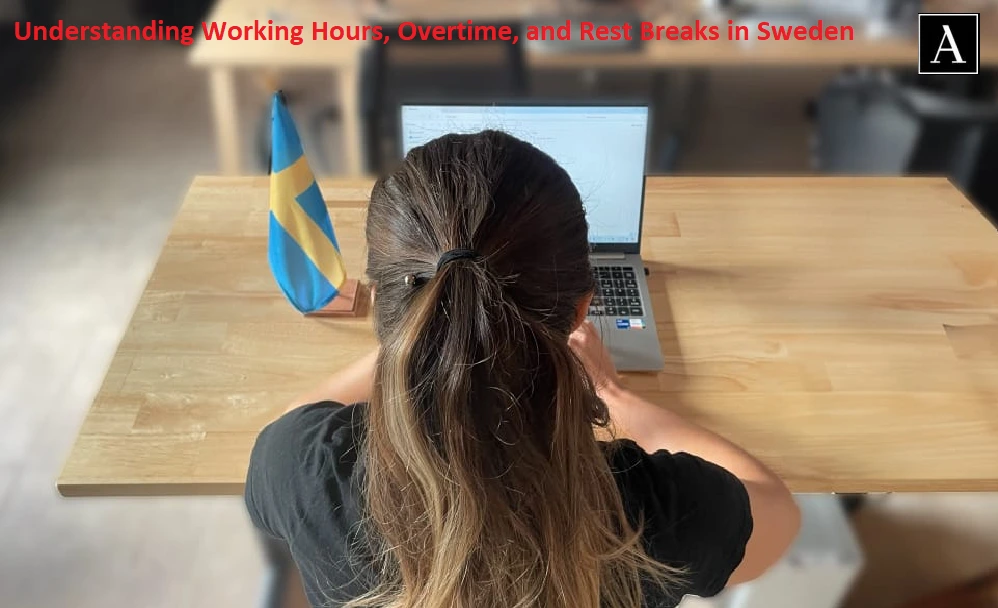 Understanding Working Hours, Overtime, and Rest Breaks in Sweden
Understanding Working Hours, Overtime, and Rest Breaks in Sweden -

 Labor Law in Sweden: Important Insights on Employee Rights, Benefits and Pay
Labor Law in Sweden: Important Insights on Employee Rights, Benefits and Pay -

 Navigating Swedish Law: How to Find the Right Attorney in Sweden
Navigating Swedish Law: How to Find the Right Attorney in Sweden -

 Legal Attorney Services
Legal Attorney Services -

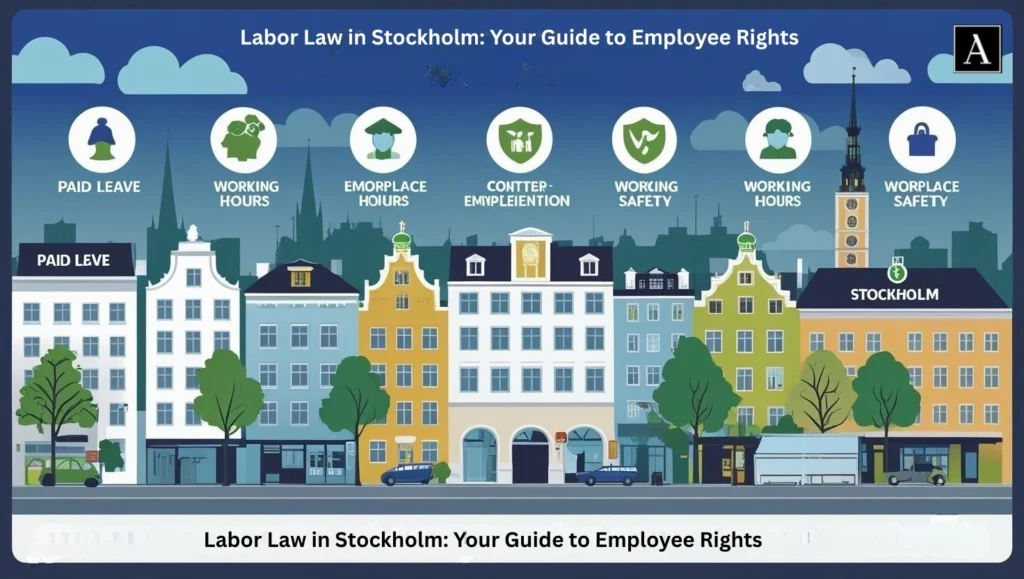 Labor Law in Stockholm: Your Guide to Employee Rights
Labor Law in Stockholm: Your Guide to Employee Rights -

 Real Estate Law That Protects Your Property, Profits, and Peace of Mind
Real Estate Law That Protects Your Property, Profits, and Peace of Mind -

 Resolving Business Disputes in Stockholm: Your Guide to Expert Legal Solutions
Resolving Business Disputes in Stockholm: Your Guide to Expert Legal Solutions -

 How to Avoid Common Pitfalls for Compliance and Corporate Law in Sweden?
How to Avoid Common Pitfalls for Compliance and Corporate Law in Sweden? -

 Real Estate Attorney in Sweden: Navigating Property Laws for Buyers and Sellers
Real Estate Attorney in Sweden: Navigating Property Laws for Buyers and Sellers -

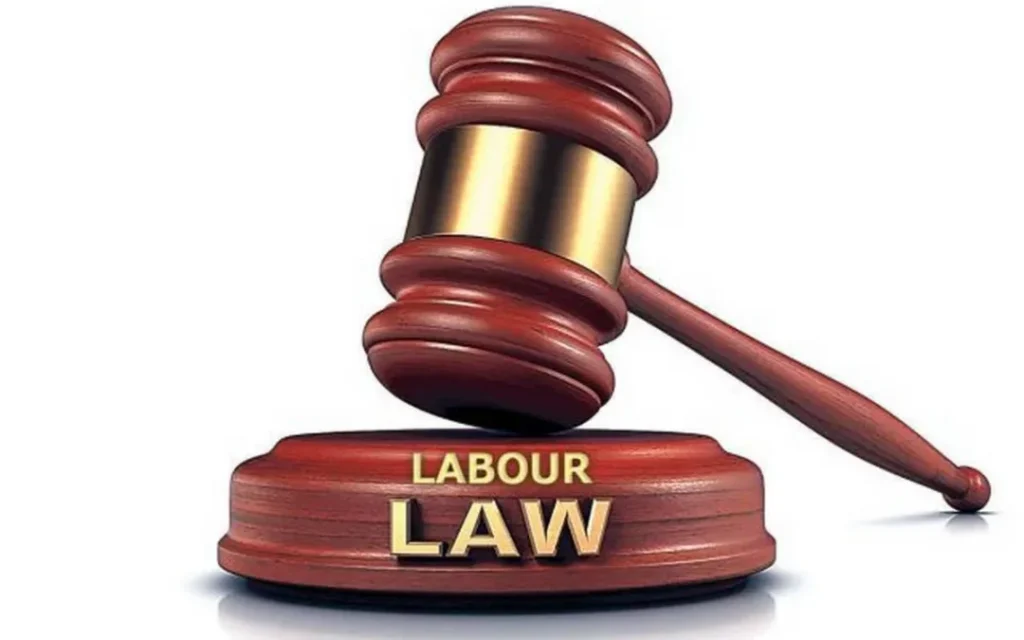 Welcome to Advantage Law Firm
Welcome to Advantage Law Firm -

 Why Get Expert Legal Support for International Employment Disputes?
Why Get Expert Legal Support for International Employment Disputes? -

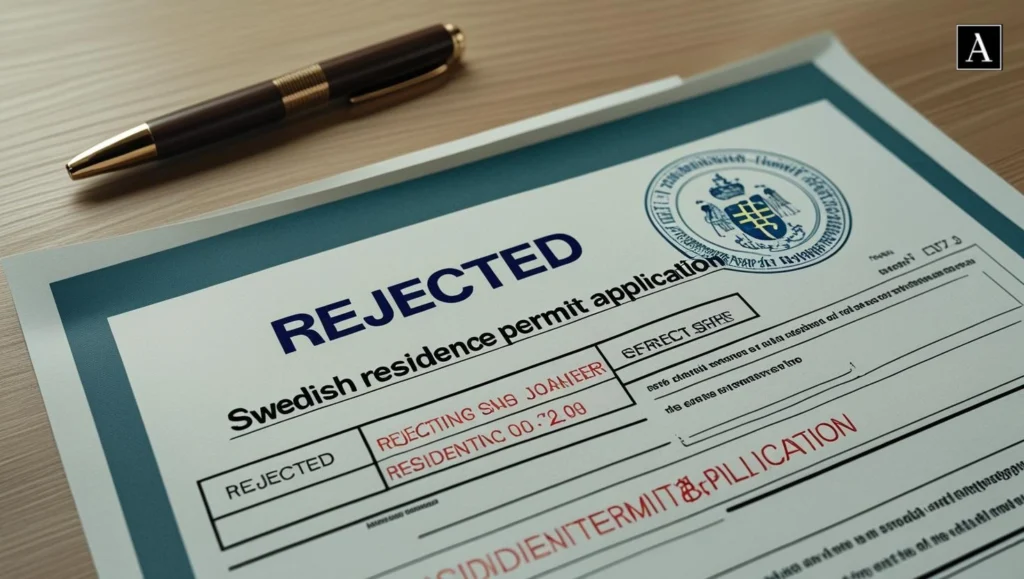 How to Appeal a Rejected Residence Permit in Sweden
How to Appeal a Rejected Residence Permit in Sweden -

 Advantage Affärsadvokatbyrå är specialist på entreprenadrätt
Advantage Affärsadvokatbyrå är specialist på entreprenadrätt -

 Legal Consultation
Legal Consultation

